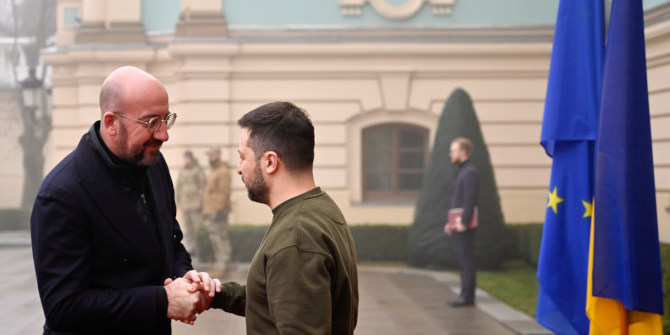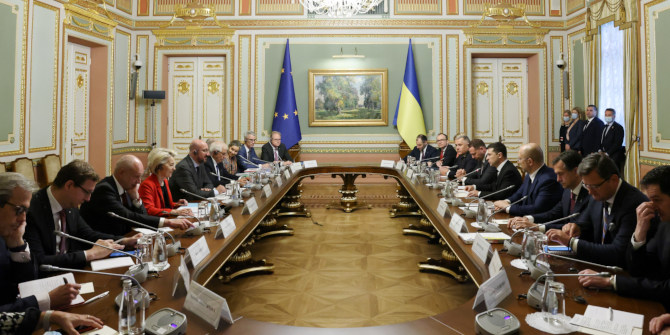Russia’s invasion of Ukraine is likely to produce a decisive shift in Europe’s security architecture. Álvaro Vasconcelos writes the EU now has a vital role to play in ensuring peace in Europe and building an inclusive European order with post-Putin Russia.
Vladimir Putin’s military invasion of a sovereign nation is a reaffirmation of the power politics that tragically marked Europe in the first half of the 20th century. Today, this politics represents an existential threat to the foundation of European integration and peace on the continent. After all, the European Union was conceived as a means to delegitimise power politics between its member states; in effect, by adopting a Kantian democratic peace, predominantly through economic integration as its justification. President Putin’s invasion of Ukraine has, however, showed this justification to be insufficient.
Of course, we already knew that democracies faced internal challenges to their legitimacy and stability, but we are now confronted with an external, familiar and old-fashioned threat generated by the Russian leader’s extremist ethno-nationalism. The consequence has been that the Union’s original peace dividend has vanished and defence has become, once again, a priority for European democracies – with some novel implications as well.
A future European security structure
Germany is to become a major military power once again and, even without nuclear weapons, it will acquire far greater capacity for action outside the European Union as a global player. Yet, as long ago as the end of the 1980s, the French President, François Mitterrand, demanded deeper European Economic and Monetary Union and the creation of the single currency as a condition for German unification. The aim was to tie a newly united Germany to European integration and to stop any temptation for that new Germany to act as a major power outside a European framework.
Yet, ironically enough, the war in Ukraine has imposed anew a qualitative leap in European defence integration. It has become necessary to ensure that an arms race between member states does not lead to the disintegration of the Union into rival powers acting autonomously. It must also be ensured that European security does not become dependent on the preferences and priorities of a United States increasingly focused on the Pacific and which might return to the strategies of the Trump administration’s years in power.
French President, Emmanuel Macron, has proposed a new European defence fund of 200 billion euros as a necessary step to ensure that that European member states will have the necessary strengthened military capacity to achieve such an outcome. Yet a sudden expansion in European defence capacity will raise questions as to how such expanded military expenditure could be rendered democratically accountable and what conditions would therefore be placed on the use of such force. The Treaty of Lisbon, which provided the European Union with its legal personality in December 2007, did introduce a mutual security clause, but sought to adjust its terms to the concerns of the United Kingdom and neutral states by limiting its application to the fight against terrorism and humanitarian crises.
It is hard to imagine today, however, that a military attack on a state of the Union, even one that is not a member of NATO, would not meet with a common response. Yet, if it did not, this alone would bring the European Union itself to an end as well. It follows, then, that Russia’s threats to Sweden and Finland demand a similar unequivocal response from Europe itself; to attack a European state will mean, in effect, starting a war with the European Union.
Ukraine’s own future in Europe
This has, in itself, a highly significant implication for it means that, in effect, Ukraine does become intimately associated with the European Union, even if it is not formally a member. That, in turn, raises the question of the security guarantees that Kyiv would consider essential to sign a peace agreement, even if it has already recognised that it would not be a member of NATO. I believe that the European Union’s ambition should be to create the conditions to make this possible. If the Union, together with the United Kingdom, expands its defence as it has proposed, it, as the second largest economy in the world, will have the capacity to do so.
The use of force in response to military aggression is guaranteed by Article 51 of the United Nations Charter: “Nothing in the present Charter shall prejudice the inherent right of individual or collective self-defence in the event of an armed attack against a Member of the United Nations”. Thus, it is not because they do not have this right that NATO states do not intervene directly to defend Ukraine against the Russian invasion, but because they consider that such an intervention could lead to escalation and to a world war with a potential recourse to nuclear weapons.
That concern, in turn, has implications for the Union’s and European NATO’s relationship with the Atlantic Alliance. A Europe with the independent capacity to act militarily is key to ensuring a more balanced relationship within the Alliance, for it will continue to play a key role in restricting, as well as ensuring, the credibility of nuclear deterrence. Yet, in doing so, it will not act like a traditional power, in that it would consider war as the continuation of state policy by other means, in Clausewitz’s memorable phrase. To do so would be to jeopardise the very justification of its own existence, its ability to de-legitimise power politics.
It is, after all, only within the framework of a multilateral order and in strict compliance with its own principles that the Union may use force – in defence of its sovereignty when attacked, in aid of a state that is the victim of aggression, or in peace operations linked to human security. Human security, in short, should be the guideline of European defence policy and international peace its main objective. Otherwise, in a world without established principles of international order but of armed competition between states instead, the project of a peaceful Europe based on Kantian principles faces enormous difficulties. The war in Ukraine has severely shaken the foundations of the post-war international order, deepened, as they were, in the 1990s.
Rebuilding the multilateral order
One of its greatest victims has, of course, been the United Nations. Despite the overwhelming vote of its General Assembly, in which only five countries voted against condemning the war in Ukraine, the United Nations has been unable to generate any initiative that could lead to an end to the invasion because of the lock placed upon it by the Security Council. Nor can the international organisation play the role that should be its own; to guarantee the safety of humanitarian corridors and supplies to cities under siege.
Yet the European Union’s re-affirmation as a key political and military power may enable it to play a central role in rebuilding the multilateral order. In the immediate future, however, its first and urgent task is to halt the invasion of Ukraine and to ensure that the occupying troops there withdraw. It can contribute to this by increasing logistical and military support to the Ukrainian armed forces, for the failure of aggression is the first step towards restoring international order. That, after all, was the lesson of the invasion of Kuwait by Iraq or of Iraq by the United States. The future political and military manifestation of the European Union, therefore, will be a decisive actor in ensuring peace in Europe and building an inclusive European order with post-Putin Russia.
Note: This article gives the views of the author, not the position of EUROPP – European Politics and Policy or the London School of Economics. Featured image credit: European Council





